外研版 必修3 Module 4 Sandstorms in Asia Grammar
文档属性
| 名称 | 外研版 必修3 Module 4 Sandstorms in Asia Grammar | 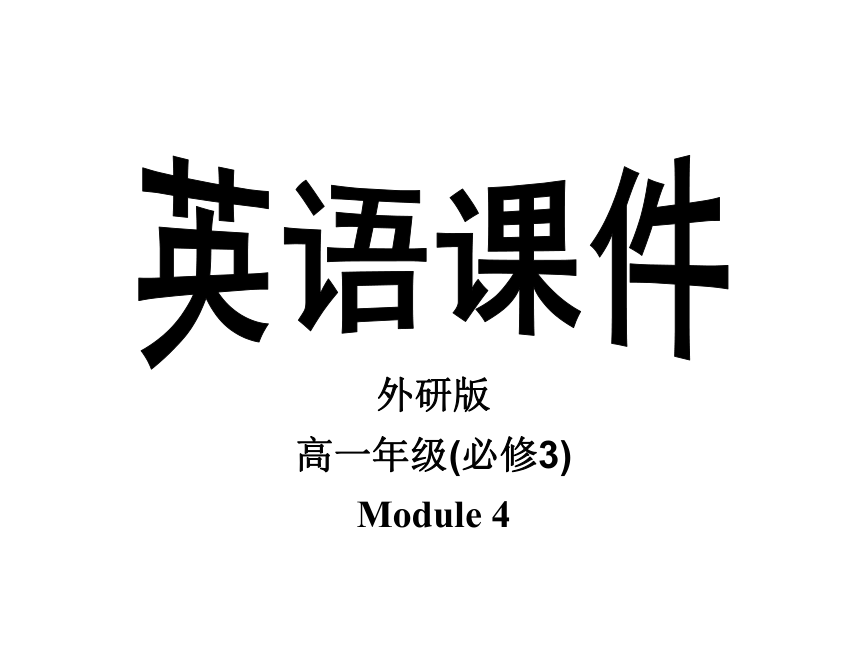 | |
| 格式 | zip | ||
| 文件大小 | 694.7KB | ||
| 资源类型 | 教案 | ||
| 版本资源 | 外研版 | ||
| 科目 | 英语 | ||
| 更新时间 | 2012-10-16 11:19:59 | ||
图片预览

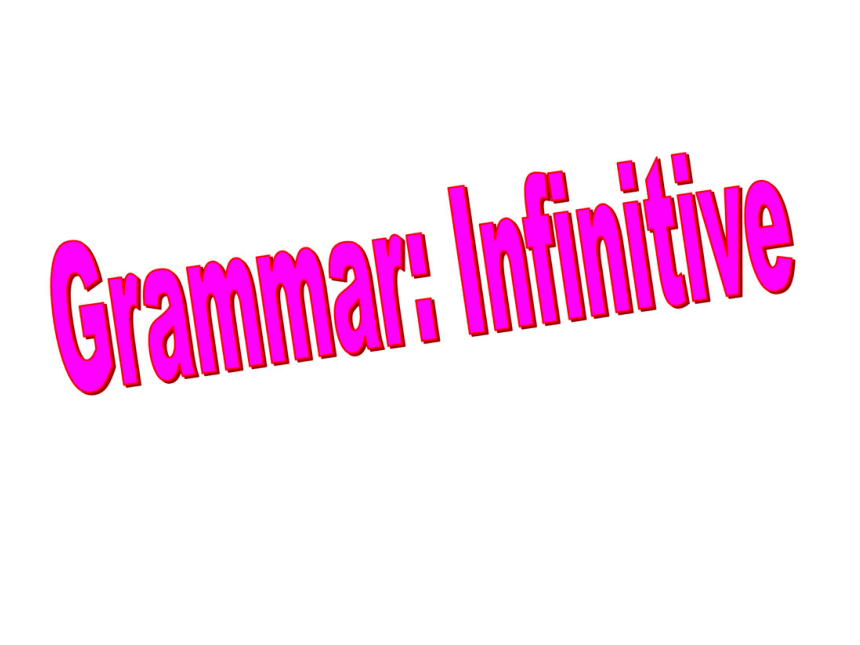
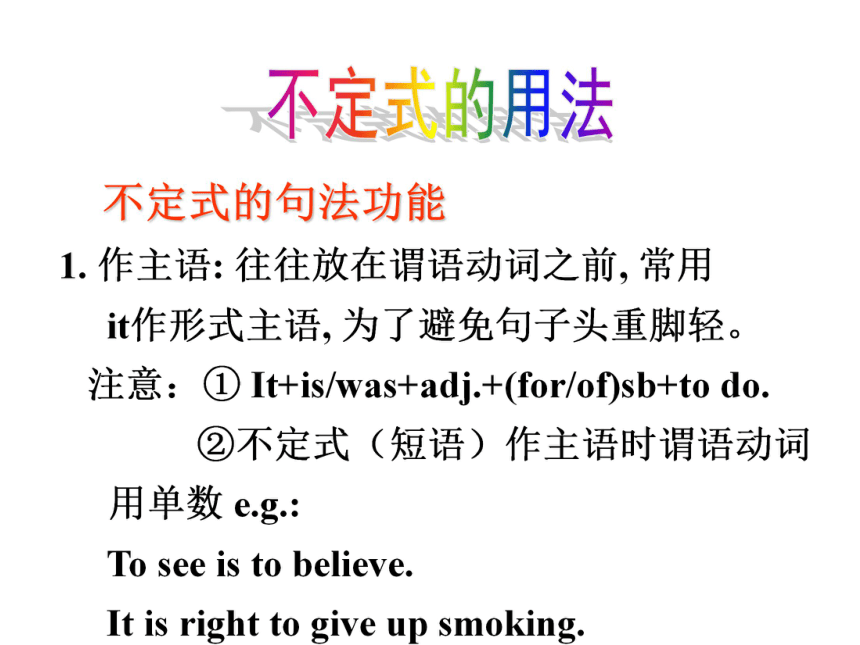
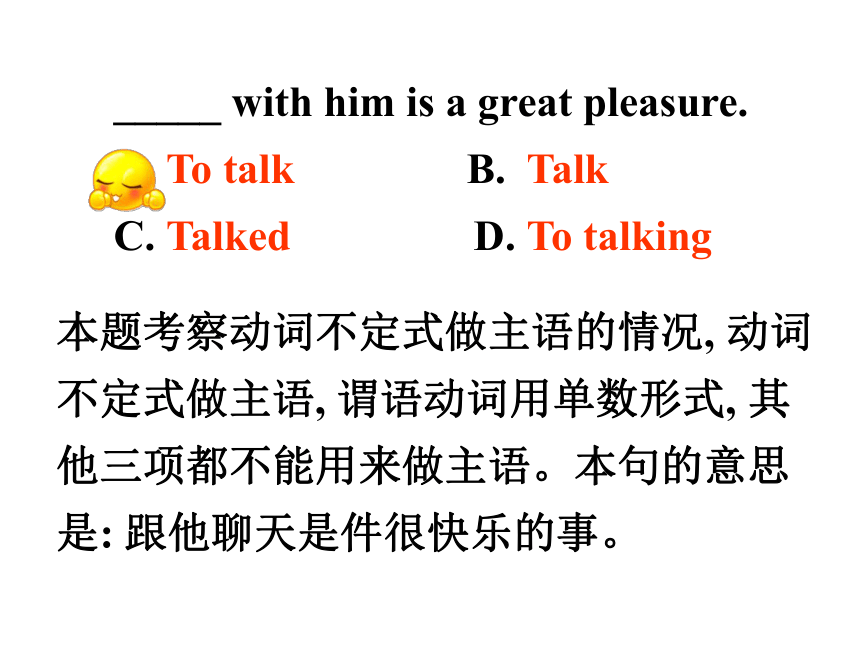
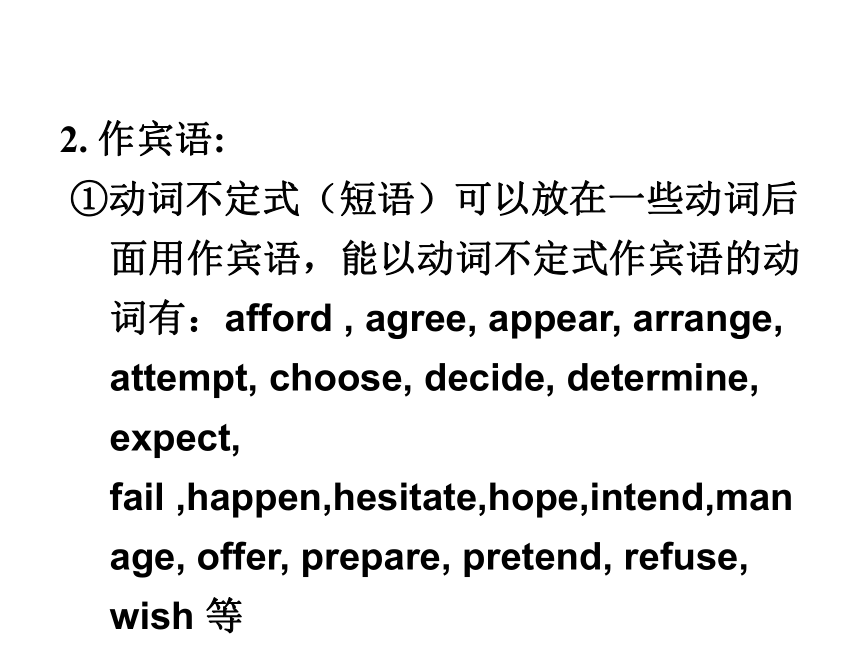

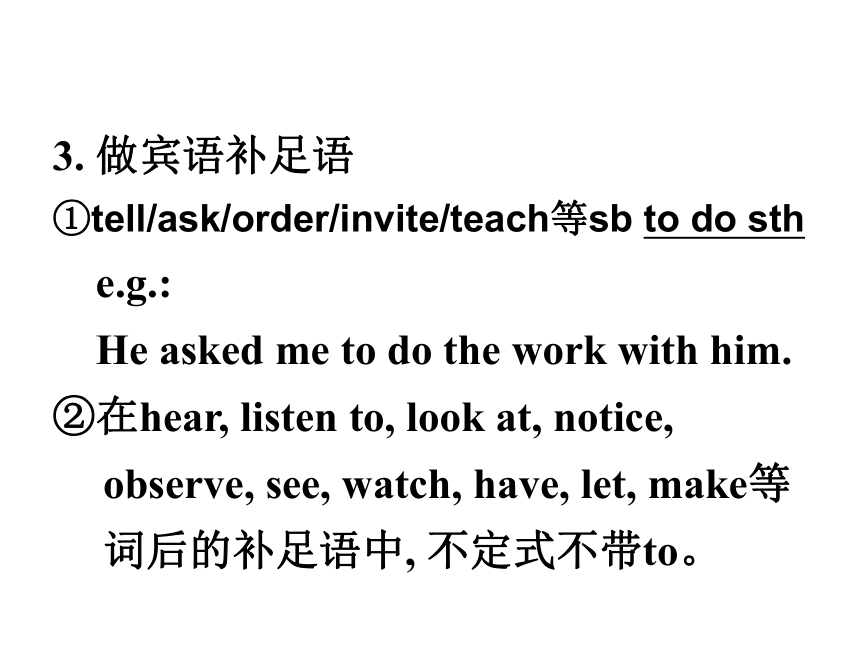
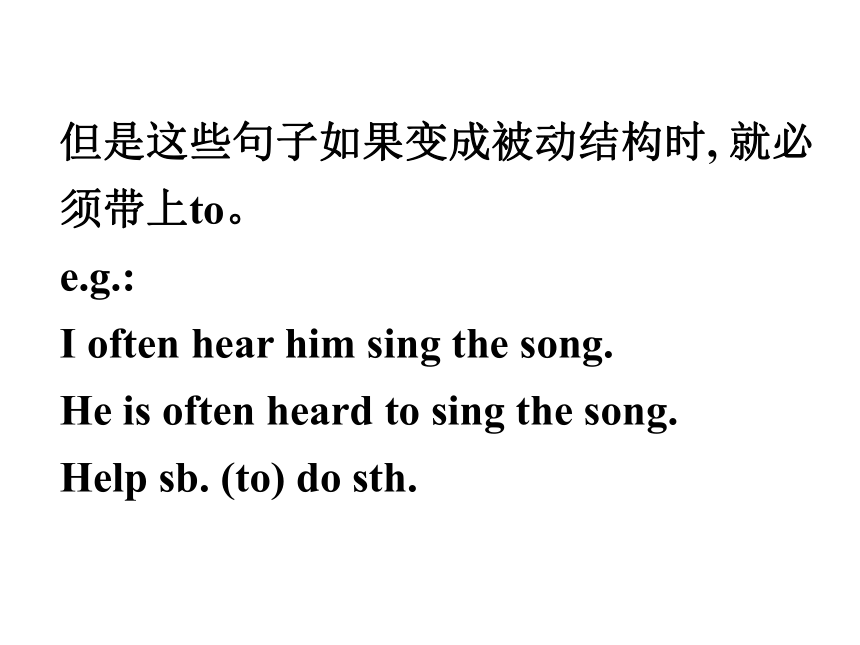
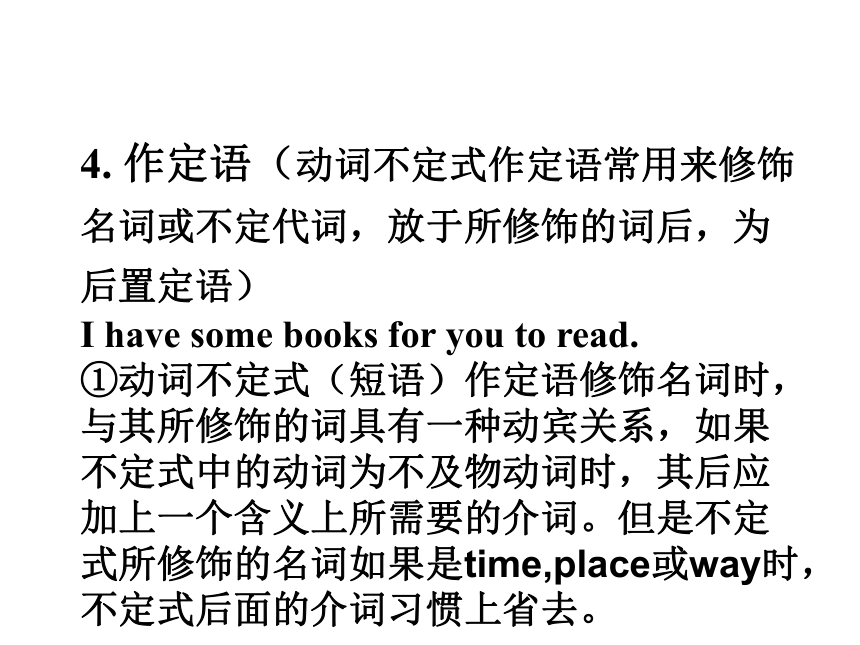
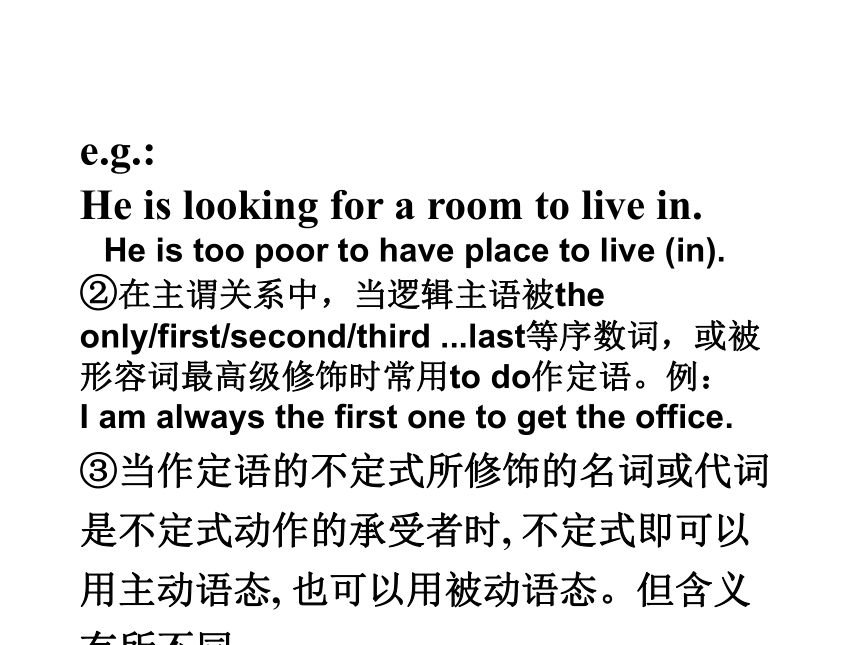
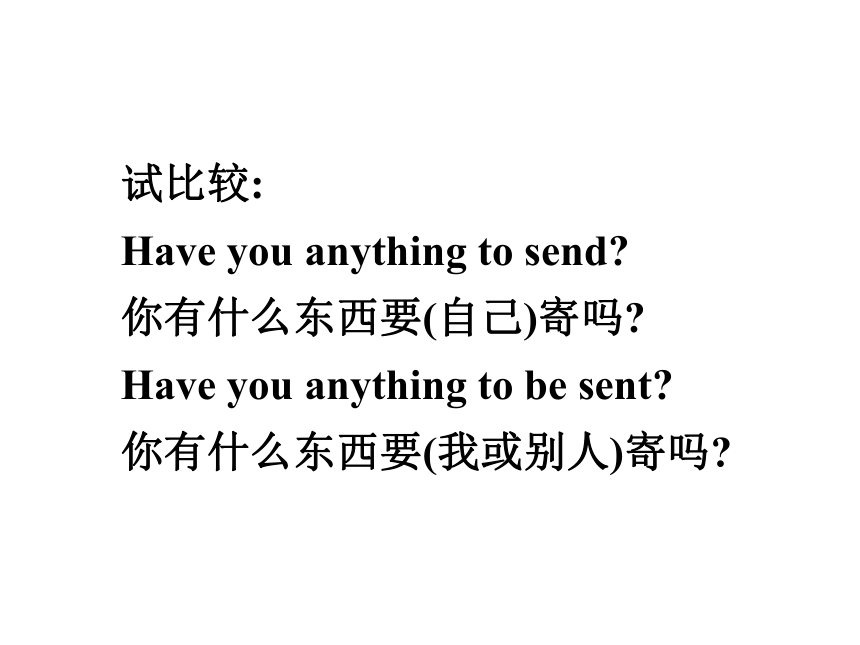
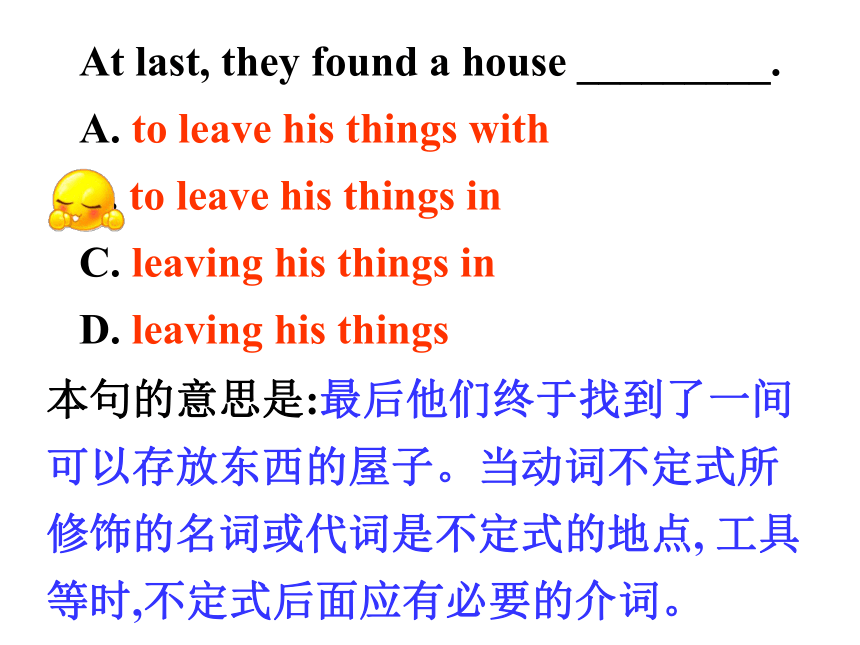
文档简介
(共48张PPT)
外研版
高一年级(必修3)
Module 4
不定式的句法功能
1. 作主语: 往往放在谓语动词之前, 常用
it作形式主语, 为了避免句子头重脚轻。
注意:① It+is/was+adj.+(for/of)sb+to do.
②不定式(短语)作主语时谓语动词用单数 e.g.:
To see is to believe.
It is right to give up smoking.
_____ with him is a great pleasure.
A. To talk B. Talk
C. Talked D. To talking
本题考察动词不定式做主语的情况, 动词不定式做主语, 谓语动词用单数形式, 其他三项都不能用来做主语。本句的意思是: 跟他聊天是件很快乐的事。
2. 作宾语:
①动词不定式(短语)可以放在一些动词后面用作宾语,能以动词不定式作宾语的动词有:afford , agree, appear, arrange, attempt, choose, decide, determine, expect, fail ,happen,hesitate,hope,intend,manage, offer, prepare, pretend, refuse, wish 等
②作宾语时如果还带有宾语补 足语, 往往把不定式放在补足语之后,而用it作形式宾语。
e.g.:
He wanted to go.
I find it interesting to study English.
make/find/think/consider…it+adj.+to do sth
3. 做宾语补足语
①tell/ask/order/invite/teach等sb to do sth
e.g.:
He asked me to do the work with him.
②在hear, listen to, look at, notice, observe, see, watch, have, let, make等词后的补足语中, 不定式不带to。
但是这些句子如果变成被动结构时, 就必须带上to。
e.g.:
I often hear him sing the song.
He is often heard to sing the song.
Help sb. (to) do sth.
4. 作定语(动词不定式作定语常用来修饰名词或不定代词,放于所修饰的词后,为后置定语)
I have some books for you to read.
①动词不定式(短语)作定语修饰名词时,与其所修饰的词具有一种动宾关系,如果不定式中的动词为不及物动词时,其后应加上一个含义上所需要的介词。但是不定式所修饰的名词如果是time,place或way时,不定式后面的介词习惯上省去。
e.g.:
He is looking for a room to live in. He is too poor to have place to live (in).
②在主谓关系中,当逻辑主语被the only/first/second/third ...last等序数词,或被形容词最高级修饰时常用to do作定语。例:
I am always the first one to get the office.
③当作定语的不定式所修饰的名词或代词是不定式动作的承受者时, 不定式即可以用主动语态, 也可以用被动语态。但含义有所不同。
试比较:
Have you anything to send
你有什么东西要(自己)寄吗
Have you anything to be sent
你有什么东西要(我或别人)寄吗
At last, they found a house _________.
A. to leave his things with
B. to leave his things in
C. leaving his things in
D. leaving his things
本句的意思是:最后他们终于找到了一间可以存放东西的屋子。当动词不定式所修饰的名词或代词是不定式的地点, 工具等时,不定式后面应有必要的介词。
5. 作状语, 表示目的, 原因, 结果或条件。
e.g.:
I came here to see you.
We were very excited to find nobody there.
He hurried to the school to find nobody there. (表示意料之外的结果)
To look at him, you would like him.
目的
原因
结果
条件
6. 作表语
e.g.: My job is to help the patient.
注意:
主, 表都是不定式, 前者为条件, 后者为目的或结果。
To learn a language is to use it.
My chief purpose is _____ the difficulties of the matter.
A. pointing out B. to be pointed
C. pointed D. to point out
本句的意思是: 我的主要目的是指出问题的难处。考查动词不定式做表语的情况。point out是“指出”的意思。
7 wh-+to do 可在句中做主语,表语和宾语。
Eg:
What to do is a problem.
My question is how to do it.
I don’t know where to go.
1. There are five pairs ____, but I’m at a loss which to buy.
A. to be chosen B. to choose from
C. to choose D. for choosing
Let’s try some more exercises.
2. I’ve worked with children before, so I know what ____ in my new job.
A. expected B. to expect
C. to be expecting D. expects
3. ______ late in the afternoon, Bob turned off the alarm.
A. To sleep B. Sleeping
C. Sleep D. Having sleep
4. With a lot of problems ____, the newly-elected president is having a hard time.
A. settled B. settling
C. to settle D. being settled
5. His wish is ______ a doctor. A. becoming
B. become
C. to become
D. being come
1. 不定式的一般形式(to do)所表示的动作通常与谓语的动作(状态)同时(或几乎同时)发生, 或是在它之后发生。
e.g.:
I saw him go out.
不定式的时态和语态
2. 如果谓语表示的动作发生时, 不定式表示的动作正在进行, 这时要用进行时(to be doing)。
I am very glad to be working with you.
3. 如果不定式的动作发生在谓语动词之前, 就要用完成时(to have done)。
e.g.:
I’m sorry to have kept you waiting so long.
4. 当不定式逻辑上的主语是这个不定式所表示的动作的承受者时, 不定式一般要用被动形式(to be done, to have been done)。
e.g.:
He asked to be sent to work in the countryside.
1. Tom ____ when they spoke ill of him. A. happened to be passed B. happened to be passing by C. happened passing by D. happened to passed
Have a try
2. All the rooms in the house require ______.
A. being cleaned
B. to clean C. cleaning
D. cleaned
3. The news reporters hurried to the airport, only ___the film stars had left. A. to tell
B. to be told
C. telling
D. told
1. 不定式在介词 but, except, besides, other than 后面时, 如果这些介词之前有行为动词do /does/did时, 那么这些介词后面的不定式不带to。
e.g.:
She could do nothing but cry.
What do you like to do besides swim
I have no choice but to wait.
There was nothing for me to do other than wait until the meeting was over.
I had nothing to do but watch TV.
2.在以下短语中to要省去 can`t help but do ”不得不做“,”情不自禁“
“ can`t choose but do ”不得不做,只得做“ can`t but do ”不得不做,只得做“
We can’t but admire his bravery.
We can’t choose but wait.
She is such a lovely girl that I can’t help but love her.
注意:
but 作 “除了……以外” 解时, 若前面部分有do, did, done时, but 之后接do sth. 反之, 后接to do sth.
He can do nothing but wait.
He wanted nothing but to play in the park. (但是)
1. Sandy could do nothing but _____ to his teacher that he was wrong.
A. admit
B. admitted
C. admitting
D. to admit
Let’s try some exercises
2. --- How did you spend your weekend,
Jone
--- I didn’t find anything interesting
for me ___ some washing instead of
my mother.
A. but did B. but do
C. but doing D. but to do
3. The students did nothing except ____ all day long.
A. played
B. playing
C. play
D. to play
Put the verbs in brackets into the correct
infinitive forms.
It is frightening ________ (walk) in
the road in a sandstorm. I hope I reach
home soon.
2. Experts hope _______ (learn) more
about the movement of sandstorms.
to walk
to learn
Some more exercises
3. I’d like __________ (tell) about the
situation before now.
4. The work needs _______________
(complete) by the end of the week.
5. My father was out of the city when the
sandstorm came. He was very glad
_____________ (miss) it.
to be told
to be completed
to have missed
6. The building has _____________
(finish) by the end of the year.
7. ______ (see) a real sandstorm was very
frightening.
to be finished
To see
I can’t help/ but hope that they
will succeed.
2. I can’t help but think/ to think that it
was a mistake.
3. I can’t chose /choose but do it.
Underline the correct answer.
He does nothing but complaining/
complain.
5. I can’t help but to love /love her.
6. The workers do nothing /not but drink tea and talk to each other.
从A、B、C、D四个选项中, 选出可以填入空白处的最佳选项。
1. The crowd cheered wildly at the sight
of Liu Xiang, who was reported _____
the world record in the 110-meter
hurdle race. (辽宁2007)
A. breaking B. having broken
C. to have broken D. to break
C
2. When asked why he went there, he said
he was sent there _____ for a space
flight. (江西2007)
A. training B. being trained
C. to have trained D. to be trained
3. _____ the project as planned, we’ll
have to work two more hours a day.
(湖南2008)
A. Completing B. Complete
C. Completed D. To complete
D
D
4. The director had her assistant _____
some hot dogs for the meeting. (2008全
国卷II)
A. picked up B. picks up
C. pick up D. picking up
C
综 合 练 习
用括号内所给动词或短语的适当形式填空。
1. I’m sorry I can’t attend your wedding,
for I have an important meeting _______
(attend).
2. The workers were made _______ (work)
over fourteen hours a day.
3. Your suit is a bit small on you. You
seem ________ (put on) weight.
to attend
to work
to put on
4. Tom did nothing except _______ (wait)
before his parents came home.
5. —What’s the matter with Tom
—Oh, his cell phone was left in a taxi
accidentally, never _______ (find)
again.
6. She reached the top of the hill and
stopped ______ (rest) on a big rock
by the side of the path.
to wait
to rest
to find
7. —Did he manage ________ (carry) the
books upstairs
—No, he wasn’t strong enough even
________ (move) them.
8. __________ (become) a teacher in a
university, you need to have a master’s
degree.
to carry
to move
To become
外研版
高一年级(必修3)
Module 4
不定式的句法功能
1. 作主语: 往往放在谓语动词之前, 常用
it作形式主语, 为了避免句子头重脚轻。
注意:① It+is/was+adj.+(for/of)sb+to do.
②不定式(短语)作主语时谓语动词用单数 e.g.:
To see is to believe.
It is right to give up smoking.
_____ with him is a great pleasure.
A. To talk B. Talk
C. Talked D. To talking
本题考察动词不定式做主语的情况, 动词不定式做主语, 谓语动词用单数形式, 其他三项都不能用来做主语。本句的意思是: 跟他聊天是件很快乐的事。
2. 作宾语:
①动词不定式(短语)可以放在一些动词后面用作宾语,能以动词不定式作宾语的动词有:afford , agree, appear, arrange, attempt, choose, decide, determine, expect, fail ,happen,hesitate,hope,intend,manage, offer, prepare, pretend, refuse, wish 等
②作宾语时如果还带有宾语补 足语, 往往把不定式放在补足语之后,而用it作形式宾语。
e.g.:
He wanted to go.
I find it interesting to study English.
make/find/think/consider…it+adj.+to do sth
3. 做宾语补足语
①tell/ask/order/invite/teach等sb to do sth
e.g.:
He asked me to do the work with him.
②在hear, listen to, look at, notice, observe, see, watch, have, let, make等词后的补足语中, 不定式不带to。
但是这些句子如果变成被动结构时, 就必须带上to。
e.g.:
I often hear him sing the song.
He is often heard to sing the song.
Help sb. (to) do sth.
4. 作定语(动词不定式作定语常用来修饰名词或不定代词,放于所修饰的词后,为后置定语)
I have some books for you to read.
①动词不定式(短语)作定语修饰名词时,与其所修饰的词具有一种动宾关系,如果不定式中的动词为不及物动词时,其后应加上一个含义上所需要的介词。但是不定式所修饰的名词如果是time,place或way时,不定式后面的介词习惯上省去。
e.g.:
He is looking for a room to live in. He is too poor to have place to live (in).
②在主谓关系中,当逻辑主语被the only/first/second/third ...last等序数词,或被形容词最高级修饰时常用to do作定语。例:
I am always the first one to get the office.
③当作定语的不定式所修饰的名词或代词是不定式动作的承受者时, 不定式即可以用主动语态, 也可以用被动语态。但含义有所不同。
试比较:
Have you anything to send
你有什么东西要(自己)寄吗
Have you anything to be sent
你有什么东西要(我或别人)寄吗
At last, they found a house _________.
A. to leave his things with
B. to leave his things in
C. leaving his things in
D. leaving his things
本句的意思是:最后他们终于找到了一间可以存放东西的屋子。当动词不定式所修饰的名词或代词是不定式的地点, 工具等时,不定式后面应有必要的介词。
5. 作状语, 表示目的, 原因, 结果或条件。
e.g.:
I came here to see you.
We were very excited to find nobody there.
He hurried to the school to find nobody there. (表示意料之外的结果)
To look at him, you would like him.
目的
原因
结果
条件
6. 作表语
e.g.: My job is to help the patient.
注意:
主, 表都是不定式, 前者为条件, 后者为目的或结果。
To learn a language is to use it.
My chief purpose is _____ the difficulties of the matter.
A. pointing out B. to be pointed
C. pointed D. to point out
本句的意思是: 我的主要目的是指出问题的难处。考查动词不定式做表语的情况。point out是“指出”的意思。
7 wh-+to do 可在句中做主语,表语和宾语。
Eg:
What to do is a problem.
My question is how to do it.
I don’t know where to go.
1. There are five pairs ____, but I’m at a loss which to buy.
A. to be chosen B. to choose from
C. to choose D. for choosing
Let’s try some more exercises.
2. I’ve worked with children before, so I know what ____ in my new job.
A. expected B. to expect
C. to be expecting D. expects
3. ______ late in the afternoon, Bob turned off the alarm.
A. To sleep B. Sleeping
C. Sleep D. Having sleep
4. With a lot of problems ____, the newly-elected president is having a hard time.
A. settled B. settling
C. to settle D. being settled
5. His wish is ______ a doctor. A. becoming
B. become
C. to become
D. being come
1. 不定式的一般形式(to do)所表示的动作通常与谓语的动作(状态)同时(或几乎同时)发生, 或是在它之后发生。
e.g.:
I saw him go out.
不定式的时态和语态
2. 如果谓语表示的动作发生时, 不定式表示的动作正在进行, 这时要用进行时(to be doing)。
I am very glad to be working with you.
3. 如果不定式的动作发生在谓语动词之前, 就要用完成时(to have done)。
e.g.:
I’m sorry to have kept you waiting so long.
4. 当不定式逻辑上的主语是这个不定式所表示的动作的承受者时, 不定式一般要用被动形式(to be done, to have been done)。
e.g.:
He asked to be sent to work in the countryside.
1. Tom ____ when they spoke ill of him. A. happened to be passed B. happened to be passing by C. happened passing by D. happened to passed
Have a try
2. All the rooms in the house require ______.
A. being cleaned
B. to clean C. cleaning
D. cleaned
3. The news reporters hurried to the airport, only ___the film stars had left. A. to tell
B. to be told
C. telling
D. told
1. 不定式在介词 but, except, besides, other than 后面时, 如果这些介词之前有行为动词do /does/did时, 那么这些介词后面的不定式不带to。
e.g.:
She could do nothing but cry.
What do you like to do besides swim
I have no choice but to wait.
There was nothing for me to do other than wait until the meeting was over.
I had nothing to do but watch TV.
2.在以下短语中to要省去 can`t help but do ”不得不做“,”情不自禁“
“ can`t choose but do ”不得不做,只得做“ can`t but do ”不得不做,只得做“
We can’t but admire his bravery.
We can’t choose but wait.
She is such a lovely girl that I can’t help but love her.
注意:
but 作 “除了……以外” 解时, 若前面部分有do, did, done时, but 之后接do sth. 反之, 后接to do sth.
He can do nothing but wait.
He wanted nothing but to play in the park. (但是)
1. Sandy could do nothing but _____ to his teacher that he was wrong.
A. admit
B. admitted
C. admitting
D. to admit
Let’s try some exercises
2. --- How did you spend your weekend,
Jone
--- I didn’t find anything interesting
for me ___ some washing instead of
my mother.
A. but did B. but do
C. but doing D. but to do
3. The students did nothing except ____ all day long.
A. played
B. playing
C. play
D. to play
Put the verbs in brackets into the correct
infinitive forms.
It is frightening ________ (walk) in
the road in a sandstorm. I hope I reach
home soon.
2. Experts hope _______ (learn) more
about the movement of sandstorms.
to walk
to learn
Some more exercises
3. I’d like __________ (tell) about the
situation before now.
4. The work needs _______________
(complete) by the end of the week.
5. My father was out of the city when the
sandstorm came. He was very glad
_____________ (miss) it.
to be told
to be completed
to have missed
6. The building has _____________
(finish) by the end of the year.
7. ______ (see) a real sandstorm was very
frightening.
to be finished
To see
I can’t help/ but hope that they
will succeed.
2. I can’t help but think/ to think that it
was a mistake.
3. I can’t chose /choose but do it.
Underline the correct answer.
He does nothing but complaining/
complain.
5. I can’t help but to love /love her.
6. The workers do nothing /not but drink tea and talk to each other.
从A、B、C、D四个选项中, 选出可以填入空白处的最佳选项。
1. The crowd cheered wildly at the sight
of Liu Xiang, who was reported _____
the world record in the 110-meter
hurdle race. (辽宁2007)
A. breaking B. having broken
C. to have broken D. to break
C
2. When asked why he went there, he said
he was sent there _____ for a space
flight. (江西2007)
A. training B. being trained
C. to have trained D. to be trained
3. _____ the project as planned, we’ll
have to work two more hours a day.
(湖南2008)
A. Completing B. Complete
C. Completed D. To complete
D
D
4. The director had her assistant _____
some hot dogs for the meeting. (2008全
国卷II)
A. picked up B. picks up
C. pick up D. picking up
C
综 合 练 习
用括号内所给动词或短语的适当形式填空。
1. I’m sorry I can’t attend your wedding,
for I have an important meeting _______
(attend).
2. The workers were made _______ (work)
over fourteen hours a day.
3. Your suit is a bit small on you. You
seem ________ (put on) weight.
to attend
to work
to put on
4. Tom did nothing except _______ (wait)
before his parents came home.
5. —What’s the matter with Tom
—Oh, his cell phone was left in a taxi
accidentally, never _______ (find)
again.
6. She reached the top of the hill and
stopped ______ (rest) on a big rock
by the side of the path.
to wait
to rest
to find
7. —Did he manage ________ (carry) the
books upstairs
—No, he wasn’t strong enough even
________ (move) them.
8. __________ (become) a teacher in a
university, you need to have a master’s
degree.
to carry
to move
To become
